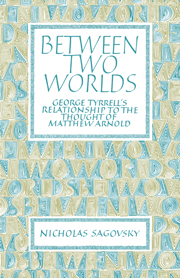Book contents
- Frontmatter
- Contents
- Acknowledgments
- Abbreviations and note on references
- 1 Tyrrell and Arnold ‘between two worlds’
- 2 The history of an opinion
- 3 ‘Definite evidence’
- 4 Fundamental convergence: epistemology and metaphysics
- 5 The life of the spirit: ecclesiology and culture
- 6 Christology: the parting of the ways
- 7 God, and ‘the Power that makes for Righteousness’
- 8 Conclusions
- Appendix Two letters to the Abbé Venard
- Notes
- Select bibliography
- Index
2 - The history of an opinion
Published online by Cambridge University Press: 23 October 2009
- Frontmatter
- Contents
- Acknowledgments
- Abbreviations and note on references
- 1 Tyrrell and Arnold ‘between two worlds’
- 2 The history of an opinion
- 3 ‘Definite evidence’
- 4 Fundamental convergence: epistemology and metaphysics
- 5 The life of the spirit: ecclesiology and culture
- 6 Christology: the parting of the ways
- 7 God, and ‘the Power that makes for Righteousness’
- 8 Conclusions
- Appendix Two letters to the Abbé Venard
- Notes
- Select bibliography
- Index
Summary
The development of George Tyrrell's thought can readily be traced in terms of the intellectual debts that he owed. As a student and a young professor of ethics he was a passionate exponent of Aquinas, not because he believed that Aquinas had provided the definitive philosophical and theological expression of the Catholic faith, but because he offered a systematic presentation of Christianity, unrivalled in its cohesion, grandeur and incisiveness. Tyrrell believed in Aquinas ‘studied critically as a system; but not delivered dogmatically as the final system’ (AL2 p. 46). Looking back, he acknowledged that Aquinas first started him on ‘the inevitable, impossible, and yet not all-fruitless quest of a complete and harmonious system of thought’ (AL1p. 248). Even at the end of his life he pounced on a copy of the Summa, taking it from Maude Petre because he considered that ‘he had the best right to it’ (AL2 p. 46).
From an early stage, however, Tyrrell recognised that there were many questions with which Aquinas could not help and, often enough, he turned to Newman for answers. It was Newman who showed him how Christian doctrine had developed, and who provided a dynamic account of religious knowledge which rang true to his experience. When assessing his debt to Newman, Tyrrell acknowledged that the Grammar of Assent ‘did effect a profound revolution in my way of thinking…just when I had begun to feel the limits of scholasticism rather painfully’ (AL2 p. 209).
- Type
- Chapter
- Information
- Between Two WorldsGeorge Tyrrell's Relationship to the Thought of Matthew Arnold, pp. 13 - 19Publisher: Cambridge University PressPrint publication year: 1983

